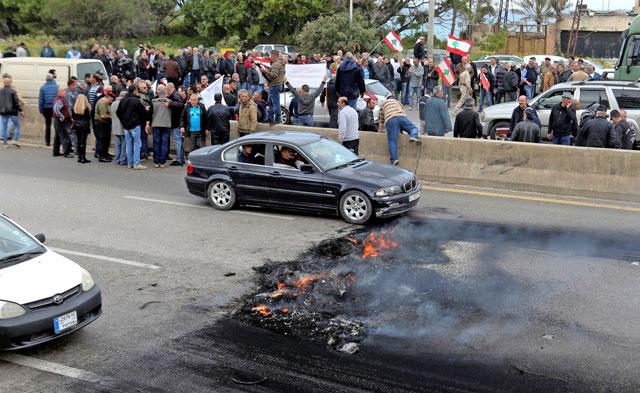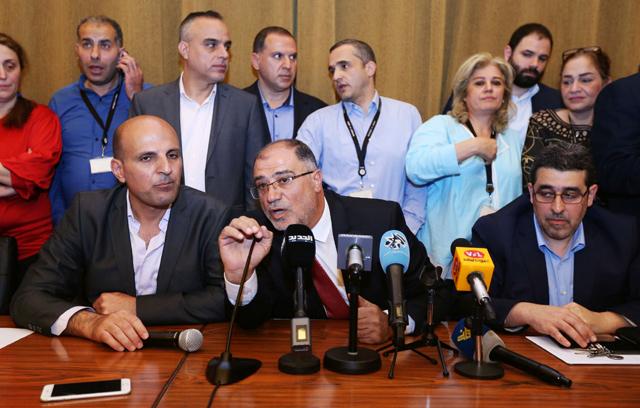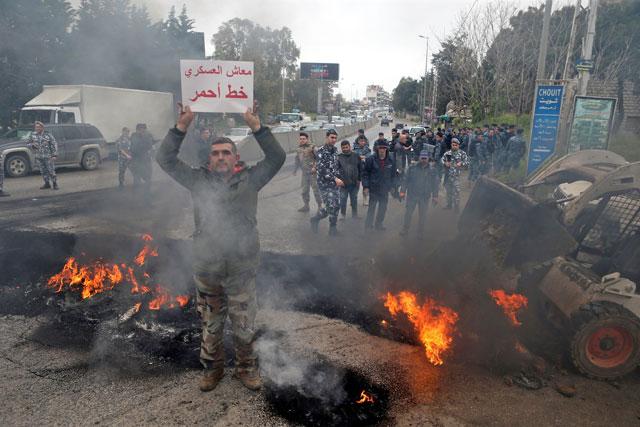You are here
Lebanese PM warns of catastrophe without austerity
By Reuters - Apr 17,2019 - Last updated at Apr 17,2019

Retired army officers hold Lebanese flags as they block a highway during a protest in Naameh, south of Beirut, Lebanon, on Tuesday (Reuters photo)
BEIRUT — Lebanon faces catastrophe if the government does not agree what may be the most austere budget in its history, the prime minister said on Wednesday, urging national unity and saying everyone should be ready for sacrifices if necessary.
Prime Minister Saad Al Hariri’s government is finalising a 2019 state budget expected to follow through on its promise of “difficult and painful” reforms to put the public finances on a sustainable path.
The budget is seen as a critical test of its will to enact reforms that economists say are more pressing than ever for an economy that has suffered years of low growth. State finances are strained by a bloated public sector, high debt servicing costs and hefty subsidies spent on the power sector.
Small protests over the last two days against cuts have underlined the political minefield facing a government that has put off reforms for years. Some public sector workers went on strike on Wednesday. On Tuesday, retired army officers blocked highways with burning tyres to warn against any pension cuts.
“What is required from us as a government today is to carry out a budget that may be the most austere in the history of Lebanon,” Hariri told reporters after a meeting of parliament, saying the government must be “sincere” with the people.
While Lebanon was not in “a state of collapse”, Hariri said that “if we continue like this we will reach a catastrophe”. Unlike other states that had suffered financial crises such as Greece, Lebanon would have no-one to save it, he added.
Debate over state spending cuts has sharpened since the foreign minister on Saturday hinted that public sector wages would be cut.
Hariri was cited by Lebanese media as telling parliament earlier that he supported recipients of state pensions but also wanted to protect the Lebanese pound, which has been pegged at its current level against the dollar for more than two decades.
After the session, he addressed soldiers and the public more widely, saying everyone should be prepared to make sacrifices if necessary, though it might not get to that point.
He held out the possibility of austerity measures that might last for a few years after which “things will return to how they were”. He also hinted at cuts to benefits enjoyed by some state workers such as overtime, furniture expenses and cars.
“Why should I make the Lebanese people bear all these costs?” he said in his comments to reporters.
Hariri, speaking in parliament, said that while the government, which was formed at the end of January, had promised to issue a 2019 state budget in one or two months, it was also trying not to harm anyone.
“We are certainly in a difficult time,” he said.
Serious steps towards reform would help Lebanon unlock some $11 billion in financing pledged at a Paris conference last year for infrastructure investment that would boost growth.
As part of its reform effort, the government last week approved a plan to overhaul the state subsidised power sector that is a major drain on finances. Parliament approved the plan at Wednesday’s session.
Related Articles
BEIRUT/LONDON — Heavily indebted Lebanon has unveiled an unprecedented plan to bring its public finances under control, but faces
BEIRUT — Employees of Lebanon's central bank on Tuesday said they were suspending a strike that has crippled the country's stock exchange an
BEIRUT — The Lebanese government has yet to disclose its budget for 2019 but protesters are already in the streets fearing the “difficult an
















